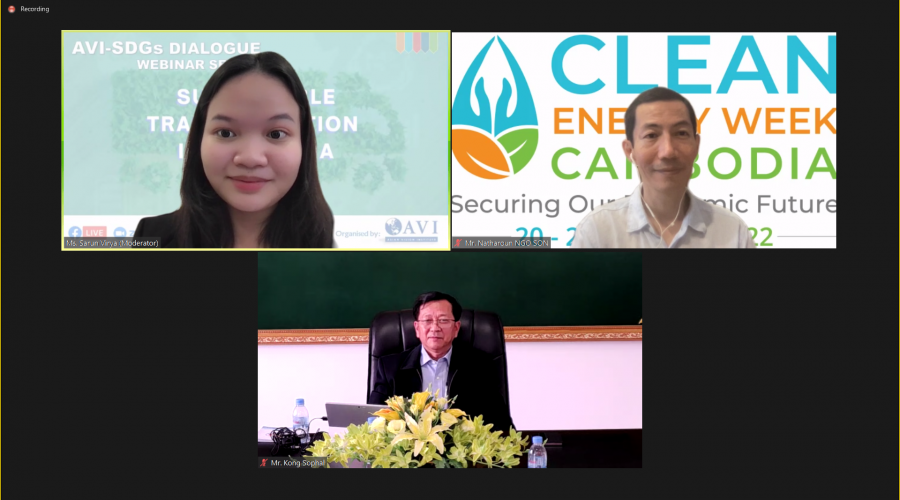On Monday, 25th October 2022, the Centre for Sustainable Development Studies (CSDS) of the Asian Vision Institute (AVI) organised the seventeenth AVI-SDGs Dialogue webinar series on “Sustainable Transportation in Cambodia” via Zoom and Facebook live stream. The distinguished panelists for this webinar include Mr. Kong Sophal, Deputy Director General of the General Department of Land Transport of the Ministry of Public Works and Transport, and Mr. Natharoun NGO SON, Country Director of Energy Lab Cambodia.
During the discussion, the panelists provided insightful presentations on the current state of Cambodia’s progress toward implementing sustainable transportation as relevant stakeholders in both the private and public sectors. To start, Mr. Natharoun NGO SON introduced one of the prominent types of sustainable transportation, E-mobility, including Electric Vehicles (EV) such as Battery Electric vehicles and Plug-in Hybrid Electric vehicles. E-mobility comes in various forms, including cars, buses, two and three-wheelers, E-bikes, and bicycles. Furthermore, the Country Director indicated that the transportation sector globally, and in Cambodia, contributes highly to carbon emissions, which requires global policy to enhance sustainable E-mobility and reduce carbon emissions. Moreover, he specified the numerous benefits of E-mobility, ranging from reducing environmental impacts such as air pollution to overall energy reduction. In addition, EVs are relatively cheaper in operation and maintenance, which can be easily integrated into the future ecosystem and decrease energy imports. Mr. Kong Sophal went deeper into some important measures enhancing sustainable transportation, considering the vast contribution of road transport to carbon emission exposure. The first measure is the integration of land use and transportation planning, the priority recommendation from various international organisations. Secondly, it is to shift from using private vehicles to mass transit, including rail transit, sky-train, and other reliable transit systems, cutting down the emission level caused by individual vehicles. Thirdly, it is to reduce or shift from internal combustion engine vehicles. The fourth measure is the promotion of non-motorised transport, such as walking and cycling. The last measure is the application of technology, such as artificial intelligence, to support the advancement of sustainable transport.
Cambodia, through various stakeholders, has been enacting multiple projects and policies to enhance sustainable transportation. For instance, the government emphasised using E-mobility and EVs as modern and eco-friendly transportation in Cambodia’s Updated Nationally Determined Contribution 2020 and the Draft National Transport Policy. Additionally, Cambodia has expanded to four EV charging stations [WU1] in the provinces with support from UNDP, including other initiatives and roadmaps introducing public electric buses, electric motorcycles, and more charging stations in other provinces. Despite the progress, several challenges still threaten the advancement of sustainable transportation, one of which is the shifting environmental impact, for example, the effect on waste management due to the disposal of batteries. The EV charging system lacks general standards, which require new public infrastructure range extenders and more destination charging stations. Developing an intelligent transport system is challenging as it requires extensive actions from numerous ministries in collaboration and other private sectors. In addition, the development of the public transport system in a small city like Phnom Penh is difficult to realise as it still has a small population density. Hence, most investors are reluctant to face the risks of investing in advancing the public transport system.
Concerning the challenges, both speakers provided various recommendations and policies for the issues. The recommendations include: banning Internal Combustion Engine (ICE) productions and distributions, implementing Electric Vehicle Subsidy Program (EVSP), and imposing credit schemes on the minimum targets of EV each manufacturer can produce. Most importantly, there should be more investment in the charging networks by creating a robust EV charging roadmap, which includes more charging locations and enhanced standard infrastructure.
In conclusion, the webinar was successfully initiated with fruitful comments and discussions on the topic. The panelists also laid out their key takeaways emphasising the change of behavior and mindset to adopt sustainable transportation step-by-step. Moreover, all relevant stakeholders, especially the private sector, should foster more investment to advance the sustainable transportation sector in Cambodia.






